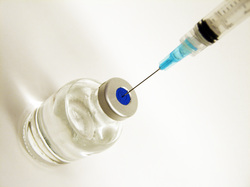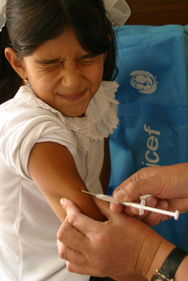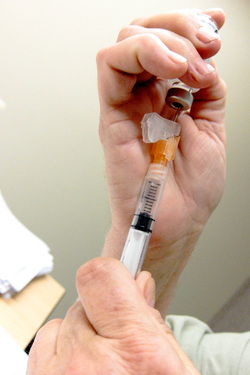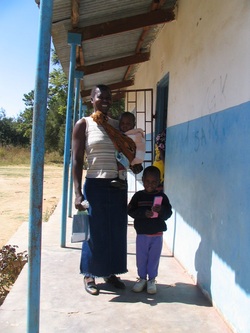 By Elizabeth Weise, USA TODAY
By Elizabeth Weise, USA TODAY SAN FRANCISCO — Got milk? If you do, take a moment to ponder the true oddness of being able to drink milk after you're a baby. No other species but humans can. And most humans can't either. The long lists of food allergies some people claim to have can make it seem as if they're just finicky eaters trying to rationalize likes and dislikes. Not so. Eggs, peanuts, tree nuts, fish, shellfish soy and gluten all can wreak havoc on the immune system of allergic individuals, even causing a deadly reaction called anaphylaxis.
 From Science DailyFeb. 18, 2013 — Children and adolescents who watch a lot of television are more likely to manifest antisocial and criminal behaviour when they become adults, according to a new University of Otago, New Zealand, study published online in the journal Pediatrics.
The study followed a group of around 1,000 children born in the New Zealand city of Dunedin in 1972-73. Every two years between the ages of 5 and 15, they were asked how much television they watched. Those who watched more television were more likely to have a criminal conviction and were also more likely to have antisocial personality traits in adulthood.
 From Chicago TribuneReuters 1:26 p.m. CST, February 15, 2013 U.S. health regulators have sent letters to nine Internet distributors of dietary supplements warning them against making false claims about their products' ability to fight the flu.The Food and Drug Administration posted the letters on its website late Thursday to steer consumers away from a variety of herbal products that the distributors claim reduce the duration or severity of the flu.
 Robyn VinterWednesday
06 February 2013 08:30Some US farmers are considering returning to conventional seed after increased pest resistance and crop failures meant GM crops saw smaller yields globally than their non-GM counterparts. Farmers in the USA pay about an extra $100 per acre for GM seed, and many are questioning whether they will continue to see benefits from using GMs.
 Stephen Dinan washingtontimes.com February 6, 2013President Obama’s health care law will push 7 million people out of their job-based insurance coverage — nearly twice the previous estimate, according to the latest estimates from the Congressional Budget Office released Tuesday.CBO said that this year’s tax cuts have changed the incentives for businesses and made it less attractive to pay for insurance, meaning fewer will decide to do so. Instead, they’ll choose to pay a penalty to the government, totaling $13 billion in higher fees over the next decade.But the non-partisan agency also expects fewer people to have to pay individual penalties to the IRS than it earlier projects, because of a better method for calculating incomes that found more people will be exempt.Overall, the new health provisions are expected to cost the government $1.165 trillion over the next decade — the same as last year’s projection.With other spending cuts and tax increases called for in the health law, though, CBO still says Mr. Obama’s signature achievement will reduce budget deficits in the short term.During the health care debate Mr. Obama had said individuals would be able to keep their plans. http://www.washingtontimes.com/blog/inside-politics/2013/feb/5/obama-health-law-will-cost-7-million/#ixzz2L55m1ZYB
 From http://www.eurekalert.orgTeens susceptible to hepatitis B infection despite vaccination as infants Mom is link to hepatitis B infection New research reveals that a significant number of adolescents lose their protection from hepatitis B virus (HBV) infection, despite having received a complete vaccination series as infants. Results in the January 2013 issue of Hepatology, a journal published by Wiley on behalf of the American Association for the Study of Liver Diseases, suggest teens with high-risk mothers (those positive for HBeAg) and teens whose immune system fails to remember a previous viral exposure (immunological memory) are behind HBV reinfection.
 Friday, June 22, 2012 by: D Holt
(NaturalNews) For many years the stories from devastated parents have been eerily similar. A young, bright child vaccinated with MMR, has minor side effects such as high temperature and being off food, and then develops the debilitating disability of autism.Whilst the mainstream medical profession deny the link between autism and the triple shot of measles, mumps and rubella, there have been many who have argued to the contrary. Statistics show the increases in autism correlate alarmingly with the introduction and uptake of the MMR vaccine. And Now in an Italian court, there has been a landmark ruling for a child whose parents claim that his autism was triggered by MMR.The parents of Valentino Bocca have been awarded 112,000 Euro to be paid by the Italian ministry of health. They are now seeking a further 800,000 Euro in a civil case. The story is a tragic one, Valentino, developing normally, was given the shot at 14 months and started to suffer from diarrhea, lost interest in food and within a few days lost the ability to use his spoon. Worse was soon to come when he began to be restless at night, screaming in pain for hours. It was later found that he was suffering from a painful bowel condition that is common in autistic children. With an adjusted diet of no wheat or milk, he was able to sleep but the autism symptoms continued, and even at the age of nine, he still does not speak.
 By Corydon Ireland
Harvard News Office Ganmaa Davaasambuu is a physician (Mongolia), a Ph.D. in environmental health (Japan), a fellow (Radcliffe Institute for Advanced Study), and a working scientist (Harvard School of Public Health). On Monday (Dec. 4), she drew on all those roles during a lunchtime talk to most of her fellow fellows. Ganmaa's topic was lunch-appropriate: the suspected role of cow's milk, cheese, and other dairy products in hormone-dependent cancers. (Those include cancers of the testes, prostate, and breast.) The link between cancer and dietary hormones - estrogen in particular - has been a source of great concern among scientists, said Ganmaa, but it has not been widely studied or discussed.
 UNZA researcher attributes increase in cancer in Zambia to consumption of foods that contain soya From Lusaka TimesA researcher from the University of Zambia School of agricultural sciences has attributed the increase in breast and cervical cancers in Zambia to consumption of foods that contain soya. The researcher has further disclosed that soya foods are leading to the development of other non communicable diseases such as leukemia, high blood pressure and diabetes. Martin Sampa made the revelation on Friday when he appeared before the parliamentary committee on health, community development and social welfare which is looking at breast, cervical cancer and diabetes in Zambia.
|










